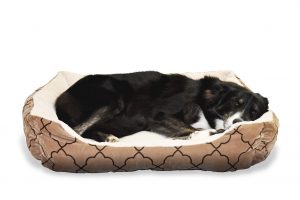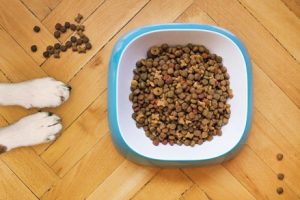One of the most common questions asked is, “Are Border Collies Picky Eaters?” Many Border Collie owners can feel frustrated when their pup starts to be a picky eater, often with good reason.
After all, mealtime guarantees one of the few times with their canine companion. But it doesn’t have to be like that.
Your Border Collie is a picky eater! It’s not just you. What is going on here? Don’t you remember all of the great meals that you fed your Border Collie in earlier years?
Good times, right?
Those tasty chunks of dog food tumbling into your dog dish. Some of it probably even made it into their mouth.
If you’d like to get back to those days, let’s have a look at why your Border Collie might be on strike and how to change their mind once more.
WHY IS MY BORDER COLLIE PICKY?
Border Collies are dogs that can have a variety of different personalities and quirks. As owners, there’s no doubt that you want to do your part to make sure their character is one of the best and brightest. That especially goes for when it comes time for mealtimes.
Border Collies can be great dogs, but at the same time, they have their finicky and picky eating habits. So much so that it might raise concern and need for others to probe into why a Border Collie is “picky” at mealtimes.
1. YOUR BORDER COLLIE IS NOT HUNGRY AT ALL
Is he hungry?
We often miscalculate how much our dogs should eat, especially if we’re giving them biscuits or a kibble because it’s energy-dense.
Often we put a little more food in that bowl. The packages overestimate the amount that we should be feeding.
You will often see that your Border Collie does not eat enough of his food, and then when you give him a treat, he eats it.
Think of it this way, if you have a toddler who has eaten his food whole, even after that if you give him chocolate, he will eat it too. It is the same with our Border Collies too.
We often assume that he was still hungry, but he did not feel like eating his food, whereas the matter is different. He ate the treat because it was tastier than what he had eaten. You offer them something delicious, and they can’t stop themselves.
You keep treating them, giving snacks, etc., throughout the day, so when it comes to mealtime, they’re not hungry.
Measure their weight to know whether they are underweight, healthy, or overweight. If your Border Collie weight is correct, you do not need to worry about how much he is eating. They’re getting their requirements, and they’re getting what they need.
2. YOUR BORDER COLLIE IS BORED.
It is a phrase that thousands could say, “My dog doesn’t eat, but I never imagined it was because he was bored.”. Why does this fact surprise us so much? Dogs, like humans, get bored of always eating the same thing. You have to vary! Imagine if you ate lentils every day of the year. 😐
How can I feed my dog so he doesn’t get tired of always eating the same thing? The best way to do that is to provide a comprehensive, natural, and healthy diet, combining different ingredients (meat, fish, fruits, vegetables). Make it as complete and varied as possible. Remember, we are what we eat!
If your dog still shows disinterest, you can mix them with other fresh ingredients. (Different types of meat and fish, pieces of fruit, cooked vegetables, natural yogurt).
You have to exercise some restraint with the picky eaters because if you keep changing their food all the time, that can cause issues. After all, you’re changing the gut flora.
So changing food all the time because you think the dogs are picky and fussy is not the correct way to solve the problem.
Once you know you’ve got a food that has all the nutritional benefits. If it’s not doing any internal damage to the dog then stick with it. It would be best to change how you look at your pet rather than keep changing the food.
3. YOU SPOILED YOUR BORDER COLLIE!
Picky Eaters are not born but made. Border collies are intelligent and immediately realize that if they tinker with their daily diet, they will get attention, and it is also likely that they will get something nice and tasty to eat.
The problem with picky Border Collies is more often our behavior than theirs. Feeding your dog table scraps or too many treats can only encourage him to become finicky.
Your dog will learn to leave food in his bowl while waiting for other more exciting foods. So stop feeding him at the table and reduce the treats.
If when your dog was younger, you offered him different foods to “see what he liked,” chances are you made him feel like he could skip a few meals and expect something better.
If you open several boxes of food to try to encourage your dog to eat at every meal, then your dog is ordering!
4. YOUR BORDER COLLIE MIGHT BE ANXIOUS
Every dog is different, but border collies, as a breed, tend to be nervous and easily spooked. Being nervous can reduce your dog’s appetite. Just like people, Border Collies do not eat much if they are stressed.
Did you think humans were the only ones to develop depressive states? Think again: our Border Collies suffer from it too.
5. YOUR COLLIE HAS NOT BEEN EXERCISING ENOUGH
When Border Collies are put to work, they do a great deal of activity, whether training or running around. This helps to burn off the calories for their day.
Like many other active breeds, Border Collies have a very efficient metabolism. Their body needs most of the energy of what they eat to stay enthusiastic and energetic, and hence food gets entirely digested in their body.
If your dog is eating the same food as before, but he does not exercise vigorously for at least a couple of hours, then he will probably have a low appetite for food. And, one more reason to not eat his meal.
Border Collies are not voracious eaters. That’s why they must have a reason to eat the food. Getting exercise is a good solution.
OTHER REASONS WHY THEY ARE NOT EATING OR BEING PICKY
If your border collie always used to eat a lot, recently lost his appetite, is just eating selective food, and is not eating as much as before, this suggests they may not be healthy.
Do you see them urinating an awful lot more frequently? Do they have diarrhea and are vomiting? Are they losing weight, and quite quickly?
Oral health plays a role in appetite. Do they have a lot of yellow plaque and tartar on their teeth? Are the lines of their teeth and gums inflamed and red? If they have gingivitis, maybe there is bleeding too?
Sometimes their teeth break. If there is anything else that we need to be thinking about is their breath. If their teeth smell, that may signify either a dental or an oral health issue.
So if you’ve got any concerns about any of these, then you should be calling your vet.
Check how healthy they are because, in some cases, that could be causing their reduced appetite.
WHAT CAN I DO TO MAKE IT STOP?
Once the vet has made it clear that he is fit and fine and his appetite loss is due to a behavioral problem, you can try several different treatments to regain your dog’s taste buds.
1. GIVE HIS FOOD A FLAVOR OR RATHER AN ENTICING SMELL IN HIS BOWL
In a dog, it is first and foremost the sense of smell that enables him to judge the delicious nature of his food. In other words, this means that a dog will rely on the smell he perceives from the food to know whether he wants to eat it or not.
It is also partly why boxes of dog food are generally better accepted by picky dogs than kibble. You have to put your nose over a bowl of mash and compare it with a bowl of kibble to realize it.
And, when it comes to smells, dogs don’t quite taste the same as we humans do. As a general rule (but there are always exceptions), dogs are more attracted to foods with strong smells, and it “suffices” to use this preference to boost the aromas that emanate from your bowl.
You can flavor a dog kibble with fish oil, a little juice from canned tuna, or even a little gravy so your dog gives it greater attention.
Dogs also have a stronger natural taste for fat. This makes it easier for them to turn to fatty foods, oils, and fats, which are natural flavor enhancers. They will be tastier for your dog, which will make him want to “come back” to his bowl.
2. STOP FEEDING HIM TABLE SCRAPS
If your family has a habit of feeding him table scraps, they are doing them more harm than good.
Even if your dog may not like it, you should keep your meal and his separate. Even if it requires putting him in another room.
If you want him to regain his appetite, you should ignore his appeal and praise him when he consumes from his bowl.
It’s essential to make that distinction, and you have to get family and friends involved as well.
There’s no point in you trying to discipline, and then other people in the family aren’t going to follow.
3. KEEP HIS MIND FROM WANDERING
Border collies are too sensitive, and they may even be startled by the sound of a washing machine, mixer, or lawnmowers. Also, if you are watching TV, consider turning it off.
They easily get distracted from their food. They are even distracted by the shining steel bowl or their reflection in it. You can replace it with ceramics so that there is no reflection. Also, keep the bowl clean, so the only thing they can taste is the food, not the dirt on the bowl.
There are several interactive feeders in the market, which put food in the bowl when they interact with it. Such feeders can help them to eat their food.
4. EASE HIS ANXIETY. SPEND MORE TIME WITH HIM
If your dog is feeling anxious or stressed for some reason, he may not be eating his food.
Some dogs experience separation anxiety. It can be helpful to stay in the same room with them while they eat, or to plan their meals so that they eat when you eat.
Otherwise, if you know that something has changed your dog’s behavior, try to address the problem at its source.
It can be something temporary that stresses your dog, like fireworks. But if this is a long-term trigger, you can observe him to find the problem. This is very important since dogs can starve themselves if they’re nervous.
5. MAKE HIM EXERCISE
You are supposed to take him out for a walk on most days. You might have noticed that after such an exercise, your dog will want to eat a lot. This is because his body will need calories and nutrients to help it recover from physical activity.
A tired dog will have more appetite, so I recommend you take your collie for a walk and play with him so that he uses all his energy. Balls, jogging, and crawling games are some of the most fun.
HOW TO FIGURE OUT WHAT FOODS THEY DO LIKE?
It is a challenge for pet owners to find out what dog food that their dogs like. It takes time and effort to check on the ingredients if it is organic or not, read the dog food reviews, compare prices and brands. But in the end, it is all worth it.
Since your dog can’t tell you what he likes, you can pay attention to his body language. If the smell of food excites your puppy and he immediately starts eating when exposed to it, then he likes that food. Likewise, if he doesn’t get excited, then probably he doesn’t like it at all.
If he is eating his food in a hurry, he usually finds the food very tasty. But if your puppy looks at you frequently while eating food, it means that he is not that interested in that food.
If he keeps his mouth in his bowl all the time while eating and his attention does not wander elsewhere, then it is a good sign.
After eating food, if he chuckles or falls asleep, then you can also understand that he has liked the food.
WHAT HUMAN FOOD IS GOOD AND BAD FOR BORDER COLLIES?
It is likely that on more than one occasion, you have stopped to think of the food that you are about to give your dog is beneficial for your best friend or not. We all know that you should not feed gummies, chocolate, or beer to dogs, but can we offer them grapes or peppers?
Rice, lettuce, banana, carrot, pear, melon, meat, peanut butter, fish, and spinach are among the best foods for dogs without any problem.
You can also feed your Border Collies pineapple, hot dogs, potatoes, watermelon, cheese, mushrooms, tomatoes, broccoli, blueberries, strawberries, apples, and bread. However, it would help if you are not feeding it to them frequently. These food items can be troublesome if you don’t provide them in moderation.
I would not recommend feeding popcorn, prawns, almonds, cherries, celery, corn, marshmallows, or pepper.
Do not feed him onions, nuts, garlic, grapes, avocados, jelly beans, chocolates, peanuts, or beer since they can be toxic to him.






